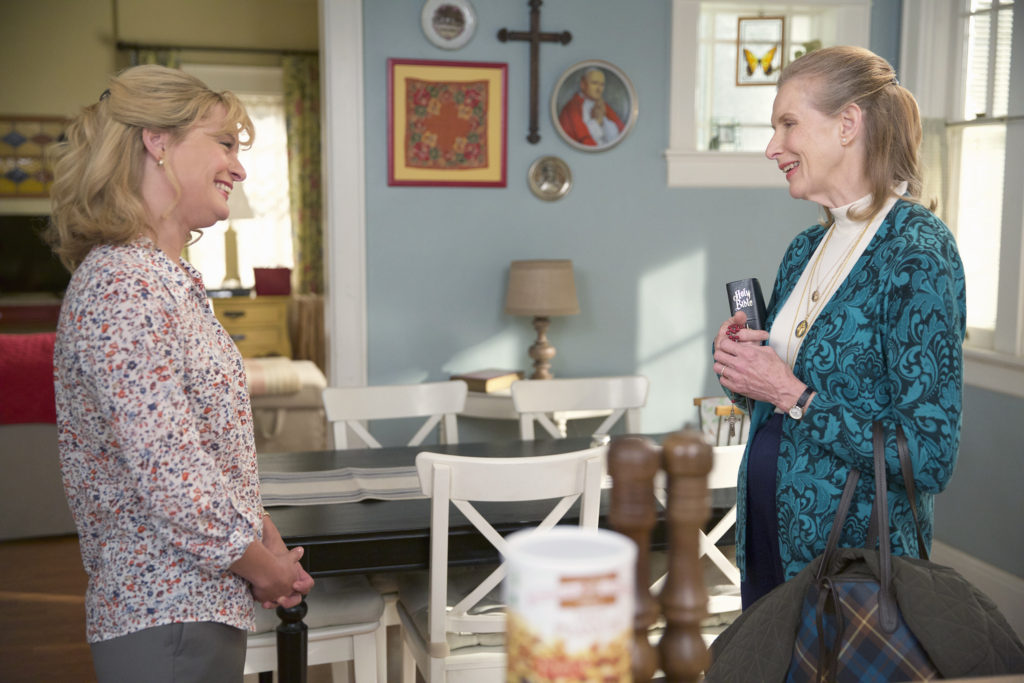

By John Mulderig
Catholic News Service
NEW YORK (CNS) — Did you know that the Catholic Church has an evil twin? To find this doppelganger, viewers need look no further than the ABC sitcom “The Real O’Neals,” which premiered March 2 and airs Tuesdays, 8:30-9 p.m. EDT.
Of course, this shadow Catholicism is not, in any sense, a faith. No one involved in it is ever seen to pray, participate in the sacraments or draw wisdom — much less comfort — from Scripture.
Instead, what is in the real world a global community of belief, is here transformed — in an offhandedly offensive way — into nothing more than a weapon. A stick, a club, the bluntest of blunt instruments, think of it as you will; in the hand of the title family’s uptight, overbearing matriarch, Eileen (Martha Plimpton), it serves a fearsome enforcer of conformity.
Sour, neurotic and fatally pleased with herself, Eileen does have a creed, and it consists of just one word: normal. The normal is perfect, and the O’Neals, with Eileen as their driving force, must maintain perfection at all times, at least in the eyes of their neighbors and fellow parishioners.
This, it seems, is the alpha and omega of what Eileen has managed to derive from a lifetime of churchgoing. Talk about bad catechesis.
As any consumer of today’s mass media readily understands, however, the desire to be “normal” is itself an unforgivable perversion in the eyes of those who are forever exhorting us to be ourselves — originally, creatively, even wildly ourselves. And so the pilot episode found the O’Neals’ conformist facade crumbling under a four-part assault.
It’s splitsville for Eileen and her police officer hubby, Pat (Jay Ferguson). Elder son Jimmy (Matt Shively), a wrestler, has anorexia. Shannon (Bebe Wood), the youngest of the clan, has been swiping the money she’s supposed to be collecting for charity. And 16-year-old younger son Kenny (Noah Galvin) — essentially the protagonist of the series — turns out to be one of them there homosexuals you’ve heard tell about from city folk.
This last bit of news turns Eileen, momentarily at least, into her very own version of a pillar of salt. Given her Medusa-like personality, though, the real wonder is that Jimmy is capable of anything approaching a healthy interaction with the opposite sex.
To return to what might be termed Eileen’s efforts to stonewall Kenny’s breakout from the closet, she not only joins forces with Kenny’s ostensible girlfriend, Mimi (Hannah Marks), she encourages the two to have a roll in the hay. Not exactly a seamless-garment approach to sexual purity.
Mimi is only too happy to cooperate, since she’s long been grooming Kenny to be the mild-mannered despoiler of her own virginity.
But, alas, the whole girl thing makes Kenny so nervous that he winds up flushing a handful of condoms, still in their wrappers, down the toilet. The result is a flood, though not of laughter.
It’s during this scene that we’re introduced to the closest thing Eileen’s Catholicism knows to a form of devotion. As Kenny explains, the church supply-sized statue of Mary that stands on a shelf above the toilet was placed there by Mom — to remind the boys to put the seat down.
Along the same lines, Eileen makes pancakes with images of Jesus on them to encourage Jimmy to eat. What Catholic mother wouldn’t?
Greedy, hypocritical clergy types being to anti-Catholicism what scheming bankers are for the imagination of the anti-Semite, we’re treated to an exchange in which Eileen’s pastor tries to get out of spending generously on parish raffle tickets by citing his vow of poverty.
“Does your Lexus know that?” the girl selling the tickets crushingly inquires.
The fact that diocesan priests — unlike the members of religious orders — don’t take a vow of poverty is not allowed to stand in the way of this delicious exposure of two-faced clerical money grubbing.
Then again, the Church clearly has no rights the media are bound to respect because — almost alone among all the institutions in our society — it continues to violate the one supreme commandment imposed by the tyranny of relativism. As famously formulated by the rebellious French students causing epochal unrest in the Paris of 1968, that precept holds: “It is forbidden to forbid.”
To the well-informed and the dispassionate, nonetheless, “The Real O’Neals” is just as false as prejudice can make it.
Mulderig is on the staff of Catholic News Service.





